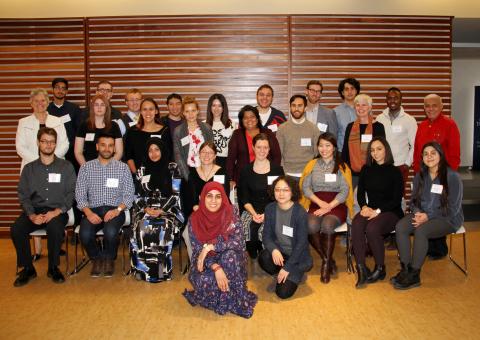New Generation Event Forges New Paths for Interfaith Conversation

On Sunday, November 12, 2017, approximately 40 people gathered at the University of Toronto’s Multifaith Centre to discuss various themes in interfaith dialogue and collaboration in an event called “Renewed Engagement: Forging New Paths for Our Interfaith Conversation.”
Most of the participants were 35 years old and under, though the event included some leaders who had participated in interfaith dialogue for decades. The event was organized by the “New Generation Interfaith Initiative,” a group of young adults from various religious backgrounds who organized the gathering as a project of the Canadian Interfaith Conversation.
A panel of speakers from different religious groups spoke on the history of interfaith work in Toronto and Canada and their own experiences, some of which spanned decades. The panel included Karen Hamilton, former General Secretary of the Canadian Council of Churches, Gerald Filson, Director of Public Affairs for the Baha’I Community of Canada, Samira Kanji, President of the Noor Cultural Centre and Leslie Mezei.
Gerald Filson set the tone for some of the day’s discussions by revealing that as a young man, he was not particularly religious and identified with secular values. He had abandoned the faith of his family, Protestant Christianity, and only adopted the Baha’I faith out of intellectual agreement. However, in recent years, as Baha’ism played a greater role in his life, Filson became increasingly frustrated with the seeming inability of secular leaders to find a place for religion in public life. Other panelists echoed this theme of feeling like a minority in a predominantly secular society. Some participants also expressed this sentiment as everyone broke into discussion groups.
The breakout discussions were designed to engage new generation voices in interfaith dialogue and collaboration. Topics included climate change, indigenous-settler relations, poverty/disparity, changing technologies, and migration and refugees. Participants discussed what interfaith groups were already doing to address these topics, and what more could be done in the future. Each group then presented their collective findings to the larger group, including recommendations for the future.
Group discussions were lively and produced pages of ideas for present and future interfaith work. Participants’ willing engagement with the issues demonstrated that young Canadians are enthusiastic about interfaith cooperation. One breakout discussion touched on the fact that those in other countries are less open to interfaith dialogue. The willingness of many different religious groups to engage in interfaith dialogue is almost a uniquely Canadian attribute.
What makes Canadians more open than others to interfaith dialogue? One reason might be that Canadians of faith have a shared experience of being a minority in a secular society. This commonality allows them to build bridges with each other on different issues. As Toronto prepares to host the Parliament of the World’s Religions next November 1-7, the “Renewed Engagement” event proved not only that religion is alive and well in Canadian society, but also that a new generation of Canadians is willing and eager to cooperate with each other in interfaith dialogue.
Rachel Baarda
November 27, 2017

